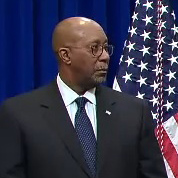 In advance of the XIX International AIDS Conference, U.S. Trade Representative Ron Kirk wrote a blog about the Trans Pacific Partnership and access to medicine. He stresses that his office has received input on IPR issues from “all sides of the issue” and are working hard to find a balance between protecting IPR and ensuring access to medicines.
In advance of the XIX International AIDS Conference, U.S. Trade Representative Ron Kirk wrote a blog about the Trans Pacific Partnership and access to medicine. He stresses that his office has received input on IPR issues from “all sides of the issue” and are working hard to find a balance between protecting IPR and ensuring access to medicines.
Without discussing the provisions in the TPP that will delay generic competition (for instance, requiring second use patents, data exclusivity, and linkage), Kirk reasserts USTR’s support for the Doha Declaration:
“We have never wavered in our support for the Doha Declaration on Trade-Related Aspects of Intellectual Property Rights (TRIPS) and Public Health, including affirming that the TRIPS Agreement can and should be interpreted and implemented in a manner supportive of WTO members’ right to protect public health. We have underscored this priority in the TPP, and stated clearly that the ‘TPP countries have agreed to reflect in the text a shared commitment to the Doha Declaration on TRIPS and Public Health’. Furthermore, in the TPP we are seeking to expand U.S. exports of both innovative and generic drugs in a way that drives access to medicines in the developing world while promoting innovation.”
Public health groups, however, have repeatedly pointed out that the intellectual property provisions proposed by the U.S. in leaked text will harm access to medicines. Examples include:
- Letter from 39 civil society groups to TPP negotiators asking them to “establish TRIPS as the maximum standard of substantive protection required by the TPP and preexisting trade agreements in the region.” February, 2011.
- Joint Statement by Médecins Sans Frontières, Health Action International—Global, Health GAP, Knowledge Ecology International, National Legislative Association on Prescription Drug Prices, Oxfam America, Public Citizen, and Universities Allied for Essential Medicine. May 2011.
- Oxfam. Analysis of US Proposals for IP and Pharmaceutical Pricing Provisions in Trans-Pacific Partnership Agreement Negotiations. November 2011.
- Public Citizen. Leaks at Trans-Pacific Trade Talks Confirm Obama Administration Backtracking from Bush Era Access to Medicines Commitments. October 2011.
- Public Citizen. Obama Trade Pact Could Impede ‘AIDS-Free Generation.’ July 2012.
Similarly, Members of Congress have often expressed their concern that TPP will interfere with access to medicines:
- Letter from 14 Democrats on the House Ways and Means Committee asking Obama to uphold the “May 10″ trade policies in the TPP. July 27, 2011.
- Letter from 10 Representatives asking for a meeting to discuss IP policies that could “undermine public health and access to medicines.” August 3, 2011.
- Letter from Reps. Lewis, Stark, Rangel, Blumenauer, and Doggett asking that the May 10th agreement serve as a “non-negotiable starting point” for access to medicines. September 8, 2011.
- Letter from Representatives Levin, Waxman, McDermott and Conyers to US Trade Representative Ron Kirk. October 19, 2011.
In reponse to last week’s blog by Kirk, the Medicines Patent Pool issued a statement saying that “the Pool reiterates the serious concerns it voiced in September 2011 about intellectual property provisions that negatively impact on access to medicines in developing countries such as those reportedly being proposed in the TPP negotiations. These include provisions requiring data exclusivity, linking patent status with medicines regulation, patenting of new uses and new forms of known substances, and the prohibition of pre-grant oppositions, all of which go well beyond the minimum requirements of the TRIPS agreement.”




